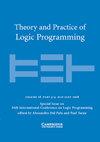Knowledge-based Reasoning and Learning under Partial Observability in Ad Hoc Teamwork
IF 1.1
2区 数学
Q3 COMPUTER SCIENCE, SOFTWARE ENGINEERING
引用次数: 0
Abstract
Abstract Ad hoc teamwork (AHT) refers to the problem of enabling an agent to collaborate with teammates without prior coordination. State of the art methods in AHT are data-driven , using a large labeled dataset of prior observations to model the behavior of other agent types and to determine the ad hoc agent’s behavior. These methods are computationally expensive, lack transparency, and make it difficult to adapt to previously unseen changes. Our recent work introduced an architecture that determined an ad hoc agent’s behavior based on non-monotonic logical reasoning with prior commonsense domain knowledge and models learned from limited examples to predict the behavior of other agents. This paper describes KAT, a knowledge-driven architecture for AHT that substantially expands our prior architecture’s capabilities to support: (a) online selection, adaptation, and learning of the behavior prediction models; and (b) collaboration with teammates in the presence of partial observability and limited communication. We illustrate and experimentally evaluate KAT’s capabilities in two simulated benchmark domains for multiagent collaboration: Fort Attack and Half Field Offense. We show that KAT’s performance is better than a purely knowledge-driven baseline, and comparable with or better than a state of the art data-driven baseline, particularly in the presence of limited training data, partial observability, and changes in team composition.Ad Hoc团队中部分可观察性下的知识推理与学习
Ad hoc团队合作(AHT)是指在没有事先协调的情况下,使一个agent能够与队友进行协作的问题。AHT中最先进的方法是数据驱动的,使用先前观察的大型标记数据集来模拟其他代理类型的行为并确定特设代理的行为。这些方法在计算上很昂贵,缺乏透明性,并且很难适应以前看不见的变化。我们最近的工作介绍了一种架构,该架构基于非单调逻辑推理,利用先前的常识领域知识和从有限示例中学习的模型来预测其他代理的行为。本文描述了KAT,一种用于AHT的知识驱动架构,它大大扩展了我们先前架构的能力,以支持:(a)行为预测模型的在线选择、适应和学习;(b)在存在部分可观测性和有限通信的情况下与队友合作。我们在多智能体协作的两个模拟基准领域(堡垒攻击和半场进攻)中演示并实验评估了KAT的能力。我们表明KAT的性能优于纯粹的知识驱动基线,并且可以与最先进的数据驱动基线相媲美或更好,特别是在有限的训练数据、部分可观察性和团队组成变化的情况下。
本文章由计算机程序翻译,如有差异,请以英文原文为准。
求助全文
约1分钟内获得全文
求助全文
来源期刊

Theory and Practice of Logic Programming
工程技术-计算机:理论方法
CiteScore
4.50
自引率
21.40%
发文量
40
审稿时长
>12 weeks
期刊介绍:
Theory and Practice of Logic Programming emphasises both the theory and practice of logic programming. Logic programming applies to all areas of artificial intelligence and computer science and is fundamental to them. Among the topics covered are AI applications that use logic programming, logic programming methodologies, specification, analysis and verification of systems, inductive logic programming, multi-relational data mining, natural language processing, knowledge representation, non-monotonic reasoning, semantic web reasoning, databases, implementations and architectures and constraint logic programming.
 求助内容:
求助内容: 应助结果提醒方式:
应助结果提醒方式:


